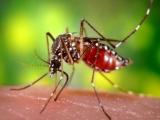Vaccine developer Inovio today reported promising results of a preclinical trial of its DNA-based Zika virus vaccine in mice.
The vaccine prompted a robust immune response in laboratory mice, clearing the way for the vaccine to be tested next in nonhuman primates, Inovio Pharmaceuticals, based in Plymouth Reading, Pa., said in a news release. The company is developing the vaccine with partners at GeneOne Life Sciences and academic institutions.
J. Joseph Kim, PhD, Inovio's president and CEO, said that, following nonhuman primate tests, it plans to start phase 1 human trials by the end of 2016.
Inovio's vaccine targets multiple Zika virus antigens with DNA constructs generated by its proprietary SynCon vaccine technology. The vaccine was given to mice with its electroporation delivery system. All vaccinated mice showed evidence of seroconversion as well as robust and broad T-cell response.
The company said it has already published similarly promising findings for two other flavivirus vaccine candidates using the SynCon platform: one against dengue and the other against West Nile virus.
Other companies developing vaccines
At a media briefing today sponsored by the Kaiser Family Foundation, Tony Fauci, MD, director of the National Institute of Allergy and Infectious Diseases, said federal officials are in contact with at least three companies that are developing Zika virus vaccines, with more likely to step forward.
He said a Zika virus vaccine might be available for emergency use, especially in child bearing-aged women, in the next 3 to 5 years, and that if disease transmission continues at a brisk pace in the affected regions, phase 3 trials might proceed fairly quickly and should take 6 to 8 months. Fauci said DNA-based vaccines, which don't contain live attenuated viruses, would likely have good safety profiles for use in pregnant women.
Last week a World Health Organization (WHO) official commenting on rapid developments with vaccines said at least 15 companies have been identified as possible participants.
Mexico notes 80 cases
In other developments, Mexico has confirmed 80 Zika infections as of Feb 12, 6 of them in pregnant women, Reuters reported today, citing the country's health ministry. Seventy of the cases have been reported in two states in southeastern Mexico, Chiapas and Oaxaca.
In late November when Mexico's first two locally transmitted cases were reported, one was in Chiapas, while the other was in Nuevo Leon state in the northeast.
More risk communication advice
Also, two well-known public health risk communications consultants have weighed in with additional observations in the wake of new developments, a follow-up of their initial assessment that the WHO and the US Centers for Disease Control and Prevention (CDC) are doing an overall excellent job so far with messaging.
In a commentary posted on their Web site yesterday, Peter Sandman, PhD, and Jody Lanard, MD, based in Brooklyn, N.Y., discussed five more issues.
They noted, for example, that it would be helpful if health officials more strongly emphasized that the threat of microcephaly and other complications might turn out to be smaller than thought, after scientific evidence comes in.
They also said that recommendations about sexual precautions seem extreme, if the transmission threat from that route is as rare as experts currently think.
Few altering travel plans
Finally, worries about Zika virus aren't stopping Americans from making plans to travel abroad, but those with plans want more information about the threat, according to a recent survey of 300 people who had traveled internationally in the past 5 years.
The online survey, launched on Feb 11, was conducted by the University of Florida's Tourism Crisis Management Initiative. About a quarter of the respondents had travel plans over the next 3 months, and of that group, 90% said they'd keep their plans and 44.3% said they'd take extra precautions against Zika virus.
More than half, however, said they didn't have enough information, with the CDC scoring highest as the source of the most trusted information.
See also:
Feb 17 Inovio press release
Feb 16 Reuters story
Feb 16 Sandman and Lanard risk communication commentary
Feb 16 University of Florida press release





















